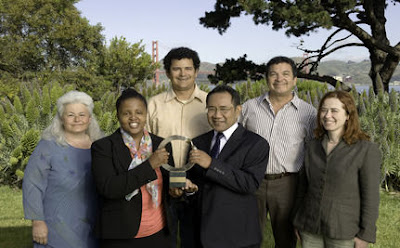via CAAI News Media
posted by: Nancy Roberts
Hope found a home last night as six fearless individuals making a difference were honored with Goldman Environmental Prizes. Some 4,000 environmentalists packed the San Francisco Opera House as the prizes were accepted by three men and three women from across the globe, who each took home $150,000 in the 21st year of the Prize.
The Care2 community will recognize the issues that faced each of these amazing leaders--their concerns are our concerns: animal welfare, environmental conservation, a healthier food system, and protecting the rights of those who need a voice: animals, indigenous peoples, family farmers and ecosystems.
Each prizewinner's inspiring path was different, yet there were common threads. Personal courage in the face of threats and patient, dogged relentlessness were key. Education, including scientific or legal training, was vital: several of the awardees spoke of being inspired by teachers and mentors to keep fighting for what is right. Expertise comes in many forms: Cuban winner Humberto Rios Labrada noted the essential cooperation and mutual learning between trained agronomists and local farmers that have brought about an organic farming revoution in his country.
Each winner worked within the system, using existing laws or political structures to call for transparency or change. Thuli Brilliance Makama, Swaziland's only environmental lawyer, used her training to fight to allow environmentalist groups to monitor government actions in protection of land and native peoples, whose interests were often seen as contradictory. And each winner recognized the importance of grassroots efforts, from rallying the people of Costa Rica to protest huge foreign fishing interests using brutal shark finning practices, to involving farmers in Cambodia in understanding how to co-exist with wild elephants, to calling on hundreds of protestors to demonstrate in sub-freezing temperatures to stop bulldozers from destroying a Polish forest.
Each activist took on a seemingly impossible David versus Goliath scenario and made progress, as when the U.S. winner Lynn Henning relentlessly reported the disgusting and damaging Concentrated Animal Feeding Operation (CAFO) practices of Big Ag that were destroying land, health and hope around her family's farm.
Here is a video of the story of 2010 U.S. winner Lynn Henning:
Other winners' video introductions are also available online.
The 2010 Goldman Environmental Prize winners are:
Thuli Brilliance Makama, Swaziland
Thuli Makama, Swaziland’s only public interest environmental attorney, won a landmark case to include environmental NGO representation in conservation decisions and continues to challenge the forced evictions and violence perpetrated against poverty-stricken communities living on the edges of conservation areas.
Tuy Sereivathana, Cambodia
Tuy Sereivathana worked to mitigate human elephant conflict in Cambodia by introducing innovative low-cost solutions, empowering local communities to cooperatively participate in endangered Asian elephant conservation.
Małgorzata Gorska, Poland
Małgorzata Gorska led the fight to protect Poland's Rospuda Valley, one of Europe's last true wilderness areas, from a controversial highway project that would have destroyed the region's sensitive ecosystems.
Humberto Rios Labrada, Cuba
A scientist and biodiversity researcher, Humberto Rios Labrada promoted sustainable agriculture by working with farmers to increase crop diversity and develop low-input agricultural systems that greatly reduce the need for pesticide and fertilizer, encouraging Cuba’s shift from agricultural chemical dependence.
Lynn Henning, USA
Family farmer in rural Michigan, Lynn Henning exposed the egregious polluting practices of CAFOs–concentrated animal feeding operations- gaining the attention of the federal EPA and prompting state regulators to issue hundreds of citations for water quality violations.
Randall Arauz, Costa Rica
Drawing international attention to the inhumane and environmentally catastrophic shark finning industry, Randall Arauz led the campaign to halt the practice in Costa Rica, making his country the new international model for shark protection.
The Goldman Environmental Prize organization has developed a curriculum for Grades 9-12 in Environmental Ethics. This resource is sure to inspire future environmental leaders, and produce an even wider pool of great Prize candidates in the years to come.
Learn more and watch videos of each winner's story at the Goldman Prize site.

No comments:
Post a Comment